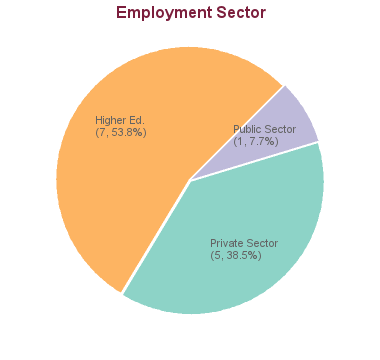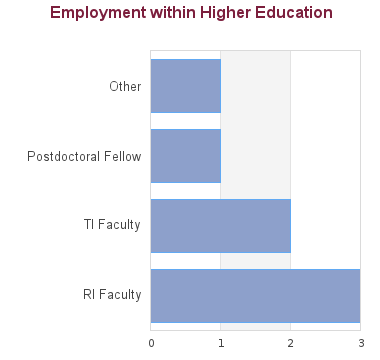Andrea Goldson Barnaby
Job Title
Lecturer and Programme Coordinator
Employer
University of the West Indies

Review details about the recently announced changes to study and work permits that apply to master’s and doctoral degree students. Read more
Food scientists integrate and apply fundamental knowledge from multiple disciplines to ensure a safe, nutritious, sustainable and high quality food supply, and to establish scientifically sound principles that guide policy and regulations pertaining to food on a global scale.
Since its inception in 1969, the Food Science Program at UBC has been a leader in providing opportunities for advanced study and research in Food Chemistry and Biochemistry, Process Science, Microbiology, Safety and Toxicology, Biotechnology, Quality Evaluation and Wine Biotechnology. Ongoing research areas include the study of nutraceuticals and bioactive compounds derived from food; biophotonic, nano-biosensing and nano-optical imaging; carbohydrate chemistry and enzymology; molecular biology and metabolic engineering of wine yeasts; farm-to-fork food safety systems; stress response mechanisms of foodborne pathogens; structure-function relationships of food and non-food related enzymes.
The innovative research conducted by UBC Food Science faculty members and students has led to national and international recognition in the form of awards and collaborations with research centres and universities both in Canada and around the world.
The program is uniquely situated in a Faculty that focuses on education and research to address issues around food, nutrition & health, and the responsible use of finite land and water resources to ensure a sustainable and safe food supply. In addition to laboratories equipped for chemical, analytical, molecular biology and microbiological (including Biosafety level 2) based research on food, the program houses pilot plant and sensory evaluation facilities for research requiring food-grade specifications.
Students can also access research facilities at UBC, such as the Laboratory of Molecular Biophysics, BioImaging Facility and Michael Smith Laboratories, as well as through collaborations with other institutions including Agriculture & Agri-Food Canada and the Department of Fisheries & Oceans.
Before you apply, please make sure you meet/exceed the admission requirements and most importantly have a supervisor confirmed.
The Faculty of Graduate and Postdoctoral Studies establishes the minimum admission requirements common to all applicants, usually a minimum overall average in the B+ range (76% at UBC). The graduate program that you are applying to may have additional requirements. Please review the specific requirements for applicants with credentials from institutions in:
Each program may set higher academic minimum requirements. Please review the program website carefully to understand the program requirements. Meeting the minimum requirements does not guarantee admission as it is a competitive process.
Applicants from a university outside Canada in which English is not the primary language of instruction must provide results of an English language proficiency examination as part of their application. Tests must have been taken within the last 24 months at the time of submission of your application.
Minimum requirements for the two most common English language proficiency tests to apply to this program are listed below:
Overall score requirement: 90
Reading
22
Writing
21
Speaking
21
Listening
22
Overall score requirement: 6.5
Reading
6.0
Writing
6.0
Speaking
6.0
Listening
6.0
Some programs require additional test scores such as the Graduate Record Examination (GRE) or the Graduate Management Test (GMAT). The requirements for this program are:
The GRE is not required.
Students admitted to the Ph.D. degree program will normally possess a M.Sc. degree in Food Science or a related area, with clear evidence of research ability or potential. Transfer from the M.Sc. to the Ph.D. program is permitted under regulations set forth by the Faculty of Graduate Studies.
The Ph.D. program requirements are as follows:
Food Science Courses numbered 500 and above: 9 credits minimum. PhD Seminar [Food Science 600 (3)] must be included in the 9 credits. Food Science graduate courses completed during an M.Sc. program may satisfy this requirement, except for the PhD Seminar course
Ph.D. Thesis (FOOD 649)
Additional coursework may be selected in consultation with the student's supervisory committee. All Ph.D. students are required to take a comprehensive examination. The major requirement for the Ph.D. is completion of a research thesis demonstrating ability to conduct significant and original scientific research.
Course Work (all 3 credit units)
FOOD 520 Advances in Food Analysis
FOOD 521 Advances in Food Biotechnology
FOOD 522 Advances in Food Chemistry
FOOD 523 Advances in Food Microbiology
FOOD 524 Advances in Food Process Science
FOOD 525 Advances in Food Toxicology
FOOD 526 Research Methods in Food Science
FOOD 527 Special Topics in Food Science
Please note classes may not be offered each year. Check with the UBC Calendar course schedule to determine specific courses offered in the current year.
All applicants have to submit transcripts from all past post-secondary study. Document submission requirements depend on whether your institution of study is within Canada or outside of Canada.
Many programs require a statement of interest, sometimes called a "statement of intent", "description of research interests" or something similar.
Students in research-based programs usually require a faculty member to function as their thesis supervisor. Please follow the instructions provided by each program whether applicants should contact faculty members.
Permanent Residents of Canada must provide a clear photocopy of both sides of the Permanent Resident card.
All applicants must complete an online application form and pay the application fee to be considered for admission to UBC.
| Fees | Canadian Citizen / Permanent Resident / Refugee / Diplomat | International |
|---|---|---|
| Application Fee | $118.50 | $168.25 |
| Tuition * | ||
| Installments per year | 3 | 3 |
| Tuition per installment | $1,875.34 | $3,294.66 |
| Tuition per year (plus annual increase, usually 2%-5%) | $5,626.02 | $9,883.98 |
| Int. Tuition Award (ITA) per year (if eligible) | $3,200.00 (-) | |
| Other Fees and Costs | ||
| Student Fees (yearly) | $1,144.10 (approx.) | |
| Costs of living | Estimate your costs of living with our interactive tool in order to start developing a financial plan for your graduate studies. | |
Applicants to UBC have access to a variety of funding options, including merit-based (i.e. based on your academic performance) and need-based (i.e. based on your financial situation) opportunities.
From September 2024 all full-time students in UBC-Vancouver PhD programs will be provided with a funding package of at least $24,000 for each of the first four years of their PhD. The funding package may consist of any combination of internal or external awards, teaching-related work, research assistantships, and graduate academic assistantships. Please note that many graduate programs provide funding packages that are substantially greater than $24,000 per year. Please check with your prospective graduate program for specific details of the funding provided to its PhD students.
This results in a net balance (any funding provided to the student minus tuition and fees) mean of $28,443 and median of $31,134.
All applicants are encouraged to review the awards listing to identify potential opportunities to fund their graduate education. The database lists merit-based scholarships and awards and allows for filtering by various criteria, such as domestic vs. international or degree level.
Many professors are able to provide Research Assistantships (GRA) from their research grants to support full-time graduate students studying under their supervision. The duties constitute part of the student's graduate degree requirements. A Graduate Research Assistantship is considered a form of fellowship for a period of graduate study and is therefore not covered by a collective agreement. Stipends vary widely, and are dependent on the field of study and the type of research grant from which the assistantship is being funded.
Graduate programs may have Teaching Assistantships available for registered full-time graduate students. Full teaching assistantships involve 12 hours work per week in preparation, lecturing, or laboratory instruction although many graduate programs offer partial TA appointments at less than 12 hours per week. Teaching assistantship rates are set by collective bargaining between the University and the Teaching Assistants' Union.
Academic Assistantships are employment opportunities to perform work that is relevant to the university or to an individual faculty member, but not to support the student’s graduate research and thesis. Wages are considered regular earnings and when paid monthly, include vacation pay.
Canadian and US applicants may qualify for governmental loans to finance their studies. Please review eligibility and types of loans.
All students may be able to access private sector or bank loans.
UBC has working agreements with MPower Financing - an organization providing international students with no-cosigner, no-collateral education loans to study in Canada - and Windmill Microlending - an organization providing loans to skilled immigrants.
Many foreign governments provide support to their citizens in pursuing education abroad. International applicants should check the various governmental resources in their home country, such as the Department of Education, for available scholarships.
The possibility to pursue work to supplement income may depend on the demands the program has on students. It should be carefully weighed if work leads to prolonged program durations or whether work placements can be meaningfully embedded into a program.
International students enrolled as full-time students with a valid study permit can work on campus for unlimited hours and work off-campus for no more than 24 hours a week during academic sessions.
A good starting point to explore student jobs is the UBC Work Learn program or a Co-Op placement.
Students with taxable income in Canada may be able to claim federal or provincial tax credits.
Canadian residents with RRSP accounts may be able to use the Lifelong Learning Plan (LLP) which allows students to withdraw amounts from their registered retirement savings plan (RRSPs) to finance full-time training or education for themselves or their partner.
Please review Filing taxes in Canada on the student services website for more information.
Applicants have access to the cost estimator to develop a financial plan that takes into account various income sources and expenses.
14 students graduated between 2005 and 2013. Of these, career information was obtained for 13 alumni (based on research conducted between Feb-May 2016):


Graduates with a PhD degree in Food Science from our program have gone on to pursue successful careers in academia and research at universities, colleges and government research centres. They may hold senior research and/or management positions in multi-national food companies, analytical testing laboratories or consulting companies, or establish independent business or consultancies.
Our graduates are making their mark in numerous parts of the world, including Australia, Britain, Canada, China, Germany, Japan, Mexico, the United States, and many other countries.
These statistics show data for the Doctor of Philosophy in Food Science (PhD). Data are separated for each degree program combination. You may view data for other degree options in the respective program profile.
| 2023 | 2022 | 2021 | 2020 | 2019 | |
|---|---|---|---|---|---|
| Applications | 21 | 13 | 9 | 14 | 26 |
| Offers | 5 | 2 | 3 | 4 | 6 |
| New Enrolment | 4 | 2 | 3 | 3 | 4 |
| Total Enrolment | 9 | 11 | 12 | 9 | 14 |
Students in research-based programs usually require a faculty member to function as their thesis supervisor. Please follow the instructions provided by each program whether applicants should contact faculty members.
These videos contain some general advice from faculty across UBC on finding and reaching out to a supervisor. They are not program specific.
This list shows faculty members with full supervisory privileges who are affiliated with this program. It is not a comprehensive list of all potential supervisors as faculty from other programs or faculty members without full supervisory privileges can request approvals to supervise graduate students in this program.
Food Science offers opportunities in the areas of food analysis, food biotechnology, food chemistry, food microbiology, food process science, food quality evaluation, food safety and toxicology, and wine biotechnology.
Departments/Programs may update graduate degree program details through the Faculty & Staff portal. To update contact details for application inquiries, please use this form.
